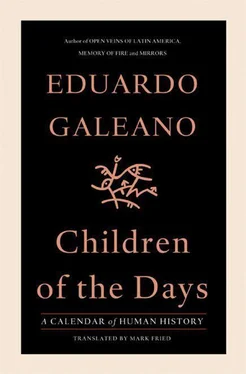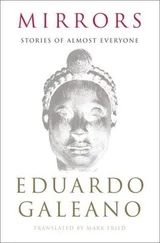The 48-page book spread faster than water or wind, and became one of the fathers of US independence.
In 1848, Karl Marx and Friedrich Engels wrote the twenty-three pages of The Communist Manifesto , which began by warning, “A specter is haunting Europe. ” It turned out to be the most influential book of the twentieth century’s revolutions.
Twenty-six pages summed up the exhortation to outrage, Indignez-vous! , that Stéphane Hessel published in the year 2011. Those few words helped unleash earthquakes of protest in a number of cities. For many days and nights, outraged people in the thousands occupied streets and squares against the global dictatorship of bankers and warmongers.
The car coughed and sputtered.
Inside, packed tight and bouncing about, was a band of musicians. They were on their way to enliven a gathering of poor farmers, but for a while now they had been lost on the boiling roads of Argentina’s Santiago del Estero.
Bereft of bearings, they had no one to ask. Nobody, not a soul remained in that desert that had once been a forest.
Suddenly, out of a cloud of dust, a girl on a bicycle appeared.
“How much farther?” they asked.
“Less,” she said.
And off she went into the dust.
January 11. THE PLEASURE OF GOING
Today in 1887 in Salta, the man who was Salta was born: Juan Carlos Dávalos, founder of a dynasty of musicians and poets.
As the tellings tell it, he was the first to drive a Model T, the “Ford with a moustache,” in those parts of northern Argentina.
His Model T snorted and smoked as its wheels rolled forward.
It moseyed down the road. Turtles stopped to wait for it.
A neighbor came up to him, greeted him with a worried face, commented, “But Mr. Dávalos. at this pace, you’ll never get there.”
The driver responded, “I don’t travel to get. I travel to go.”
January 12. THE RUSH TO GET THERE
On this morning in the year 2007, a violinist gave a concert in a subway station in Washington, DC.
Leaning against a wall, alongside the usual litter, the musician, who looked more like a local kid, played the works of Schubert and other classics for three-quarters of an hour.
Eleven hundred people hurried by without slowing their pace. Seven paused a bit longer than a moment. No one applauded. Some children wanted to stay, but were dragged off by their mothers.
No one realized he was Joshua Bell, one of the most esteemed virtuosos in the world.
The Washington Post had organized the concert. It was their way of asking, “Do you have time for beauty?”
January 13. EARTH THAT BELLOWS
In the year 2010, an earthquake swallowed a large chunk of Haiti and left more than two hundred thousand people dead.
The following day in the United States, a television preacher named Pat Robertson explained what had happened. This shepherd of souls revealed that the blacks of Haiti were to blame, that their freedom was responsible. The Devil had liberated them from French slavery and now he was collecting his due.
January 14. THE HAITIAN CURSE
The earthquake in Haiti was the culminating tragedy of a country without shade, without water, devastated by imperial greed and the war against slavery.
The dethroned slavers explain it another way: Voodoo was and is to blame for all the country’s misfortunes. Voodoo doesn’t deserve the name religion. It is nothing but African superstition, black magic, a black obsession, the Devil’s thing.
The Catholic Church, which has no shortage of faithful believers willing to sell the fingernails of saints or feathers from the wings of the archangel Gabriel, got Haiti to outlaw voodoo in 1845, 1860, 1896, 1915 and 1942.
In recent times, evangelical sects took up the battle against superstition. They come from the country of Pat Robertson, a country that has no thirteenth floor in its skyscrapers, no row thirteen in its airplanes, where civilized Christians who believe God created the world in seven days are in the majority.
In 1919 Rosa Luxemburg, the revolutionary, was murdered in Berlin.
Her killers bludgeoned her with rifle blows and tossed her into the waters of a canal.
Along the way, she lost a shoe.
Some hand picked it up, that shoe dropped in the mud.
Rosa longed for a world where justice would not be sacrificed in the name of freedom, nor freedom sacrificed in the name of justice.
Every day, some hand picks up that banner.
Dropped in the mud, like the shoe.
On this day in 1920, the Senate of the United States approved the Volstead Act, thus confirming once again that prohibition is the best publicity.
Thanks to the law that declared the country dry, alcohol production and consumption flourished and Al Capone and his men killed and earned more than ever.
In 1933, General Smedley Butler, who had led the US Marines in sixteen medal-winning campaigns on three continents, confessed that what had inspired his men was Al Capone’s success in Chicago.
January 17. THE MAN WHO EXECUTED GOD
In 1918, in the midst of the revolutionary upheaval in Moscow, Anatoly Lunacharsky presided over the court that judged God.
A Bible sat in the chair of the accused.
According to the prosecutor, throughout history God had committed many crimes against humanity. The defense attorney assigned to the case argued that God was not fit to stand trial due to mental illness; but the tribunal sentenced Him to death.
At dawn on this day, five rounds of machine-gun fire were shot at the heavens.
In the time of the Holy Inquisition, Spaniards who bathed were suspected of Muslim heresy.
From Mohammed came the adoration of water.
Mohammed was born in the desert back in the year 570, and there, in the kingdom of thirst, he founded the religion of water-seekers.
He said what God, Allah, had told him to say: on the road to salvation, one must pray five times a day, bending down until the chin touches the ground, and before each prayer one must purify oneself with water.
“Cleanliness is half of faith,” he said.
January 19. WITH HIM WAS BORN AN ERA
In 1736, the Scot James Watt was born.
It is said he did not invent the steam engine, but in his modest workshop he was certainly the one who, without any great expectations, perfected the device that would power the Industrial Revolution.
From that point on, his machine gave rise to other machines that turned peasants into workers, and suddenly, bewilderingly, today became tomorrow and packed yesterday off to prehistory.
January 20. SACRED SERPENT
In 1585, at their third episcopal conference, the bishops of Mexico forbade the painting or sculpting of serpents on church walls, retables or altars.
The exterminators of idolatry had by then noticed that those tools of the Devil failed to provoke repulsion or fear among the Indians.
The pagans worshipped snakes. In the Biblical tradition serpents had been scorned ever since that business about Adam’s temptation, but America was a loving serpentarium. The sinuous reptile was a sign of good harvests, the lightning bolt that brings on the rains, and every cloud was home to a water snake. A plumed serpent was the god Quetzalcóatl, who had departed on the winding waters.
January 21. THEY WALKED ON WATER
In the year 1779, English conquistador James Cook witnessed a strange spectacle in the islands of Hawaii.
Читать дальше












